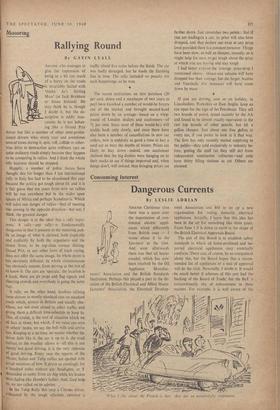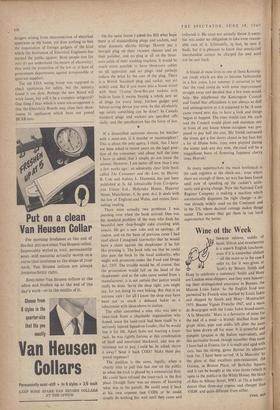Consuming Interest
Dangerous Currents
By LESLIE ADRIAN
AROUND Christmas time there was a scare over the importation of con- tinental electric appli- ances wired differently from British ones — I wrote about it in the Spectator at the time. And soon afterWards there was that oil heater scandal, which has now been resolved by the Oil Appliance Manufac- turers' Association and the British Standards Institution. Perhaps this played a part in the de- cision of the British Electrical and Allied Manu- facturers' Association, the Electrical Develop- ment Association and BSI to set up -a new organisation for testing domestic electrical appliances. Actually, IT learn that this idea has been in the air for something like three years. From June 1 it is down to earth in the shape of the British Electrical Approvals Board.
The aim of this Board is to establish safety standards to which all home-produced and im- ported electrical appliances may eventually conform. There can, of course, be no compulsion about this, but the Board hopes that a recom- mended list of appliances or a seal of approval will do the trick. Personally, I doubt it. It would be much better if schemes of this sort had the backing of the Board of Trade; but the BoT :s extraordinarily shy of enforcement in these matters. For example, it is well aware of the
'What / like about the French is that they are so wonderfully responsive.
dangers arising from misconnection of electrical apparatus in the home, yet does nothing to ban the importation of foreign gadgets of the kind which the Institution of Electrical Engineers has warned the public against. Most people (me for one) do not understand the nature of electricity : they need the protection of the law or at least of government departments against irresponsible or ignorant suppliers.
The old EDA testing house was supposed to check appliances for safety, but the industry found it too slow. Perhaps the new Board will work faster, but will it be a complete safeguard? One thing 1 hear which is some encouragement is that the Electricity Boards may close their show- rooms to appliances which have not passed BEAB tests. On the same theme I asked the BSI what hope there is of standardising plugs and sockets, and other domestic erectric fittings. Hoover put a two-pin plug on their vacuum cleaner and on their polisher, and no plug at all on the three- core cable of their washing machine. It would be much more sensible to have three-core cables on all apparatus and no plugs—and perhaps reduce the price by the cost of the plug. There is a British Standard plug and socket, not yet widely used. But if you move into a house wired with these 13-amp three-flat-pin sockets with built-in fuses it means buying a whole new set of plugs for every lamp, kitchen gadget and labour-saving device you own. In this all-electric age surely something can be done? In Canada standard plugs and sockets' are specified offi- cially. and the specification has the force of law.
If a dissatisfied customer cleaves his butcher with a meat-axe, is it murder or manslaughter? This is about the only query, I think, that I have not been asked in recent years on the legal posi- tion of the consumer; and about half the time I have to admit that I simply do not know the answer. However, I am better off now than I was a few weeks ago: an, admirably clear little book called The Consumer and the Law, by Harvey R. Cole and Aubrey L. Diamond, has just been published at 3s. 6d. (obtainable from Co-opera- tive Union Ltd., Holyoake House, Hanover Street, Manchester, 4, by post, 4s.). It deals with the law of England and Wales, and makes fasci- nating reading.
There were actually two problems I was puzzling over when the book arrived. One was the standard problem of the man who finds his beautiful new shop-bought cake crawling with insects. He got a new cake and an apology, of course, and on the basis of previous cases I had read about I imagined (correctly) that he would have a claim againit the shopkeeper if he felt like pressing it. The book tells me that he could also pass the buck to the local authority, who might well prosecute under the Food and Drugs Act, 1955. The trouble would be, of course, that the prosecution would fall on the head of the shopkeeper; and as the cake came sealed from a manufacturer, it is not certain that justice would really be done. Serve the shop right, you might say, for not doing its own baking. But that is an extreme view: for all I know the shop may have been not so much a debased baker as a tobacconist with ideas above its station.
The other concerned a mhn who was sent a toast-rack from a charitable Organisation who hoped, since the toast-rack had been made by a seriously injured Squadron-Leader, that he would buy it for 10s. Apart froM not wanting a toast- rack, he was rightly furious at this combination Of bluff and emotional blackmail, and was de- termined not to pay. Could he, he asked, throw it away? Send it back COD? Make them pay postal expenses?
The position is the same, legally, when a charity tries to pull this fast one on the public as when the trick is played by a commercial firm. He could have refused the toast-rack in the first place (though there was no means of knowing what was in the parcel). He could send it back at his own expense (not COD) or he could simply do nothing but wait until they came and collected it. He must not actually throw it away, but was under no obligation to take even reason- able care of it. Ultimately, ir) fact, he sent it back; but it is pleasant to know that unsolicited merchandise cannot be charged for and need not be sent back.
A friend of mine lives in one of those Kensing- ton roads which are due to become fashionable in a few years. Last summer it occurred to her that the road could do with some improvement straight away and decided that a few trees would help. She telephoned the Kensington Council and found that officialdom is not always as dull and unimaginative as it is supposed to be. A man came round next day to have a look and things began to happen. The trees would cost 30s. each and the Council would plant and maintain one in front of any house whose occupant was pre- pared to pay half the cost. My friend canvassed the street, got a few doors closed in her face but a lot of fifteen bobs, trees were planted during the winter and, any day now, the road will be a magnificent burst of flowering Japanese cherry trees. Hurrah !
*
In many supermarkets the main bottleneck is the cash registers at the check-out: even where there are enough of them, no way has been found until now of speeding up the cashier's arith- metic'and giving change. Now the National Cash Register Company is making a machine which automatically dispenses the right change—a de- vice already widely used on the Continent and in the US, where decimal coinage makes things easier. The sooner they get them in our local supermarket the better.











































 Previous page
Previous page